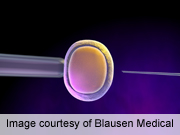
TUESDAY, Sept. 11 (HealthDay News) — Poor egg quality may explain why severely obese women have difficulty getting pregnant from in vitro fertilization (IVF), a new study indicates.
Researchers examined 276 mature human eggs that failed to fertilize from women who were undergoing IVF procedures, including 105 eggs from severely obese women and 171 eggs from normal-weight women.
For an egg to have the best chance of fertilizing and supporting embryo development, it should be “mature” with a single important egg structure called a “spindle” on which is attached one organized set of chromosomes, explained study leader Catherine Racowsky, director of the Assisted Reproductive Technologies Laboratory at Brigham and Women’s Hospital, in Boston.
She and her colleagues found that severely obese women are much more likely to have eggs with multiple spindles and disorganized chromosomes.
Nearly 60 percent of the eggs from severely obese women had two spindles, compared with 35 percent of eggs from normal-weight women, the study found. Among eggs with one spindle, nearly 30 percent of those from severely obese women had disorganized chromosomes, compared with 9 percent of those from normal-weight women.
The study, published online Sept. 11 in the journal Human Reproduction, is the first to shed light on how obesity might harm egg quality in women, Racowsky said.
She noted that the study only used eggs that were stimulated through IVF and that failed to fertilize, so it is not known if the findings can be broadly applied to all eggs.
“More research is needed to determine what is causing the spindle abnormalities and disorganized chromosomes,” Racowsky said in a hospital news release.
While the study found a link between severe obesity and egg quality, it did not prove the existence of a cause-and-effect relationship.
More information
The U.S. National Library of Medicine has more about in vitro fertilization.

